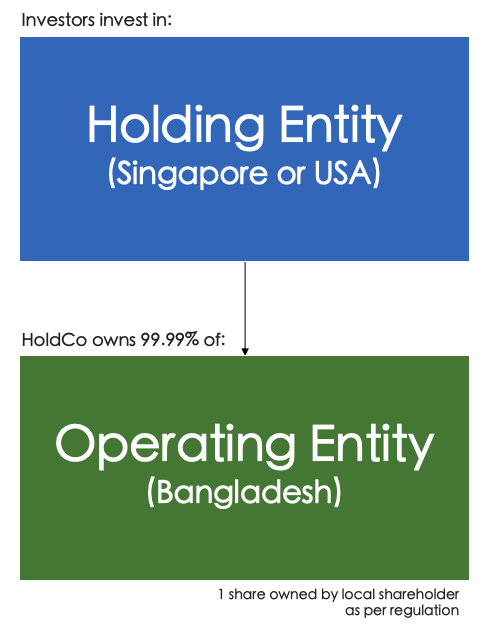Disclaimer: This is not legal advice — but observations gleaned from building the largest startup in Bangladesh: Pathao. Please talk to your lawyers!
If you are interested in building your startup in Bangladesh — it’s actually better to incorporate elsewhere first.
There’s a good reason for it:
Bangladesh has consistently ranked very low on the Ease of Business Index (It ranked 168 out of 190, Below Average in 2020).
Bangladesh corporate law does not allow for sophisticated features such as multiple classes of shares and employee stock option pools — extremely necessary in startups.
Your venture capital partners and their lawyers are less likely to understand Bangladesh Law.
As an entrepreneur — you have to provide your investors comfort and protection in investing into Bangladesh. You will have to answer questions like how you are compliant to the tax and regulatory regime, how your investors can recoup their money (either through dividends or capital gains) or even how you are going to pay your vendors!
When I started Pathao in 2015, none of these rules were clear to me, and the local lawyers were not able to help because they didn’t know either! It took me over 6 months to incorporate and set up proper banking channels — I wish I had a mentor back then who could point me to the right direction, because once you learn it, it’s very simple.
Here’s what you need to do:
Step 1: Establish HoldCo
Establish a holding entity in either Delaware or Singapore. I prefer Singapore as it has: (a) lower corporate taxes (b) the country is neutral to most Chinese investors (US-China trade-war means many investors will be wary of investing in a US HoldCo)
If you don’t know anyone in those countries — no problem, services like Sleek.sg or Stripe Atlas can help you establish a corporate identity and open up a bank account without you leaving the comfort of your couch.
Step 2: Establish LocalCo
Your local operating entity would need at least 2 directors.
Get your Company’s Name Clearance for you Bangladeshi entity from RJSC Bangladesh. You can also do this online.
Prepare the docs necessary to incorporate a Private Limited Company:
a) Memorandum of Articles and Articles of Association
b) Directors’ resolution to open a new Company in Bangladesh;
c) Obtaining and filling up the following forms for registration of the Company to RJSC:
d) Form I: Declaration on registration of Company;
e) Form VI: Notice of situation of registered office;
f) Form IX: Consent of director to act;
g) Form X: List of persons consenting to be directors;
h) Form XII: Particulars of the directors, manager and managing agentsHere’s where things start to get tricky — you will need a friendly Bangladeshi bank to work with and open up a non-active bank account. Get in touch with foreign exchange branches of top tier local banks. I have had good experiences with the City Bank (Gulshan) and UCB (Motijheel branch).
Get an Encashment Certificate from the bank in which an amount of capital has been sent from HoldCo to the LocalCo.
Now submit all the documents from (2) and (4) to RJSC to complete the process of incorporation. You will acquire:
a) Trade License
b) TIN, BIN, and VAT CertificatesAs a final step — submit your new documents acquired in (5) to the bank and turn your non-active bank account into an active current account.
Done! 🙌 Now you have both a Holding Entity through which you can give ESOP and raise capital, and a local entity through which you can use that capital. The banking channel is cleared to send money from HoldCo to LocalCo.
Notes:
Bangladesh law dictates all limited company to have at least two shareholders — you as the local partner can have 1 share, all other shares should be assigned to HoldCo (99.99% ownership).
Every time you send money from HoldCo to LocalCo, the purpose of the funds should always be “share money deposit”. You will have to choose at a later date to convert these share money deposit into actual shares.
You will need to submit your FDI returns every 3 months to your bank, which will in turn submit those document to Bangladesh Bank.
You will need additional permissions from Bangladesh Investment Development Authority (BIDA) to remit money back from LocalCo to HoldCo (in the form of dividends or otherwise).
Doing this early in your company life cycle will save you an extraordinary amount of headache down the line. You don’t want to find out in the middle of your fundraising process that you have to redo your entire corporate structure — it will set you back months and incur huge legal fees.
Again, this is not legal advice. Seriously, talk to a lawyer!

